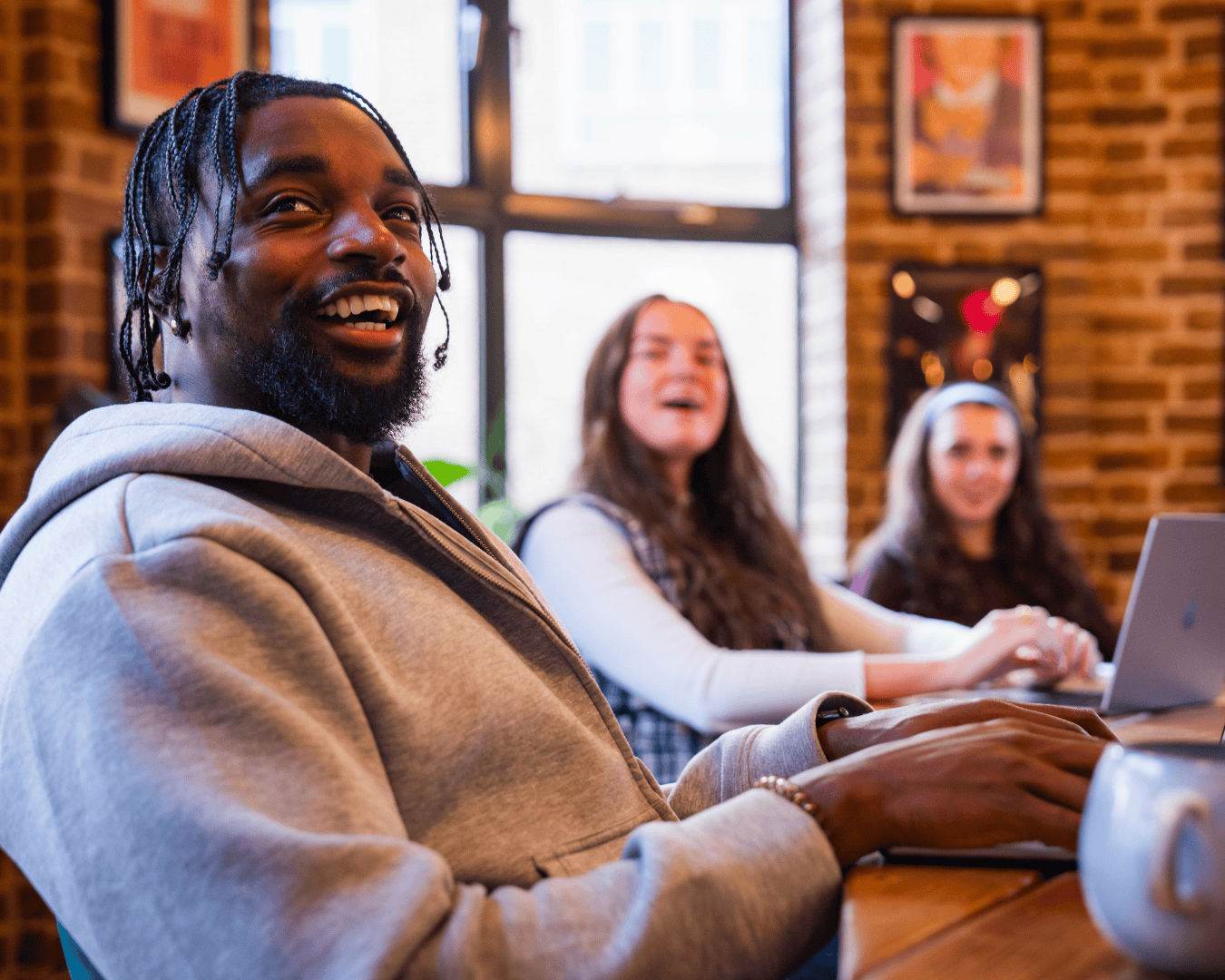Last year, I was at an Adobe event in Shoreditch with my teammates. We’d just paid a yuppy cafe way over the odds for pesto salad, a dish I wasn’t convinced was all that reasonable to offer on a menu (leave the lettuce and pop some penne in a pot surely?), and were shuffling back into the auditorium to take our seats. I lowered myself gingerly onto the floor and made a pretzel of my legs just as a question around the use of AI was asked to the panel.
What the question was exactly, I can’t remember. I don’t think it really matters to be honest. Often questions around AI in the creative industry are actually the same question but poorly disguised. Is it going to take our jobs except wearing those nose-glasses-moustache things. However, on this occasion, the answer stuck out to me.
Panel member Max Ottignon (Ragged Edge) said something along the lines of AI being a fast track to mediocrity.
This felt like a refreshing alternative to the narrative I’d heard before. The truthful-yet-unopinionated take that one must learn to use AI or face being left behind. I agree with that sentiment, but what does that mean exactly? Should I utilise a GPT as a sort of lackey which takes long-form copywriting tasks off my plate? How about outsourcing my film concept ideation to a programme which will give me infinite generations without me even having to be polite?
Funnier. More serious. Translatable into German. Funnier. Better. Better. DO A BETTER ONE RIGHT NOW. YOU THINK I’M MESSING AROUND HERE? THIS IS MY LIVELIHOOD YOU’RE TOYING WITH.
Whilst these are both entirely possible, and pervasive across the creative industry I’m sure, they are not effective uses of AI. Why? Because it will only ever give you something that’s half-baked, boring, or both. You can tell when an idea has been gifted by 1,000,000 digital chimps with typewriters because it’s nearly always underwhelming. It’s like getting the smartest person you know to write your Hinge prompts, despite them having never been in a relationship. It’s like listening to a really well-drilled wedding band on Spotify. It just feels wrong. It lacks the something-something that gets you fired up.
It lacks imagination.
But here’s the thing. The problem isn’t that AI isn’t advanced enough yet. The problem is us. We’ve become too lazy to imagine. We’re holding up two-fingers to our evolution. We’ve found a working pocket watch on a beach, crafted through centuries of crashing waves and well-placed sandgrains, but we’re checking the time on our iPhones.
I don’t blame the bleep-blorp machines for lacking imagination. They’re not supposed to have one. As far as I’m aware, we’re the only beings at least in this solar system with the gift of imagination. The ability to dream, and I’m not talking about the type of dreaming my dog does when she starts running in her sleep. I mean to truly dream. To make something out of nothing, and then choose to let it return back to nothing. All of it from mere neurons firing around a pink-grey bag of fat. It’s remarkable.
But Tom, I hear you cry, you can’t really be suggesting that we’re not imaginative? Even the creation of AI shows we still imagine.
First of all, how are you? Secondly, I never said we’re not inventive. We certainly are. But are we still imaginative? Nowhere near as much as we used to be. And here’s why.
We have become gluttonous with ‘the finished article’. The Western way of living in 2025 is orientated around shortcuts. We’re too used to getting what we want right when we want it. I want a burger at 2am. It comes to my door in 20 minutes. If it doesn’t, then I get pissed off. I get annoyed when there’s too much choice on Netflix, Prime and Apple TV. I mean, imagine explaining the conundrum of having too much entertainment to choose from to an Edwardian stableboy. It’s an insane way to live.
There’s no question that using AI can save you time. It can churn out a task before you’ve even had a chance to stick the kettle on. But I don’t think we should be looking for more ways to save time.
AI creations don’t spark our imagination at the moment because most people are looking for it to create a finished product. We need, now more than ever, to spend more time on things. To put in the effort that allows us to stand out from the crowd. We must shift our focus from the execution of an idea, to the expression of it.
So far, dear reader, all I’ve given you are complaints and problems. If you’re reading this and are picturing me smoking a cigarette and ruining a nice family meal with this rant, that’s because I am. Time for a solution.
In the presence of AI, we must become more editorial in our thinking. Try it today. Have an idea. Have two. Ask Midjourney to make it for you, and then look at the output. Don’t look for the one that’s closest to what you had in your head. Study each generation and pick something you like about it, and all the things you don’t like. Make a note of them all on a piece of paper and then take a step back. How can you incorporate what you’ve seen and put it back into your original idea? Think about how you would reinterpret the output in a way that fits your brand’s story and human connection. Now try another generation. What do you see now? Does it shake anything loose in your brain? Repeat this process, jotting down on this paper how you want your idea to look.
Now, put the laptop away. Take your paper and look after it. It’s got your idea on it, after all. If you’re skilled enough in design, have a go at making it yourself. If you’re lucky enough to work with a team of designers, go to their desk now and explain your thinking. Get tactile with it. Draw all over your paper and let them draw too.
Then it’s time to step away. It’s a creative’s job to facilitate the act of creation. Let someone else take the reins and take their time.
Now what?
I’ll leave that up to your imagination.




